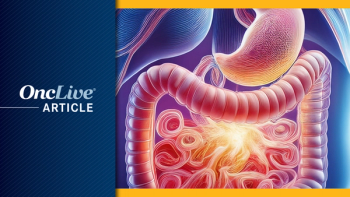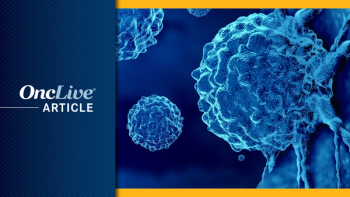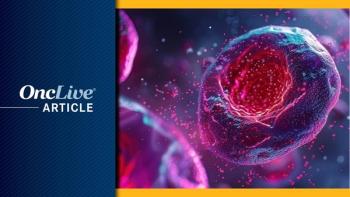
AUTX-703 Receives FDA Fast Track Designation in Relapsed/Refractory AML
Key Takeaways
- AUTX-703, a KAT2A/B degrader, received FDA fast track designation for relapsed/refractory AML, with clinical trials starting in early 2025.
- Preclinical studies showed significant survival advantages and efficacy in AML models, with well-tolerated dosing and dose-dependent survival benefits.
The FDA has granted the novel, oral KAT2A/B degrader AUTX-703 fast track designation for the treatment of patients with relapsed/refractory AML.
The FDA has granted fast track designation to the novel, first-in-class, oral KAT2A/B degrader AUTX-703 for the treatment of patients with relapsed/refractory acute myelogenous leukemia (AML).1
Previously, on February 4, 2025, the FDA cleared the investigational new drug (IND) application for the clinical development of AUTX-703.2 Based on this clearance, Auron Therapeutics, the developer of AUTX-703, plans to initiate the clinical development of the agent in patients with hematological malignancies in the first quarter of 2025.1
“We are gratified by the FDA’s recognition of AUTX-703’s potential as an important, novel treatment option for [patients with] relapsed or refractory AML, a community that remains in desperate need of new therapies,” Kate Yen, PhD, founder and chief executive officer of Auron Therapeutics, stated in a news release. “The FDA fast track designation underscores the urgent need for innovative treatments for these patients, and this milestone comes at a pivotal moment as we prepare to advance AUTX-703 into the clinic. Our team is energized by the potential to bring a first-in-class therapy to patients who have limited effective options today, while simultaneously exploring the broader applications of KAT2A/B modulation.”
Preclinical data with the novel agent that were presented at the
Data from the AML xenograft model also demonstrated that AUTX-703’s selective KAT2A/B degradation induced monocytic differentiation and inhibited cell proliferation in the AML cell line, as well as in ex vivo patient samples of primary AML. Furthermore, the agent showed strong degradation of KAT2A/B in bone marrow and spleen with dose-dependent recovery, as well as reductions in hCD45-positive/hCD34-positive blasts, with increased myeloid differentiation in peripheral blood, bone marrow, and spleen.
Following data from the preclinical study, a phase 1 clinical proof-of-concept trial in AML will begin enrolling patients in the first quarter of 2025.2
“These are the first data to demonstrate AUTX-703’s potent degradation of KAT2A/B promoting cellular differentiation and leading to a significant survival advantage in a primary AML model,” said Yen in a separate news release regarding the ASH presentation.4 “These data further validate AURIGIN’s platform capabilities to identify promising oncology targets with potential in multiple cancer types as we prepare to submit multiple IND [applications] for AUTX-703 later [in 2024].”
AUTX-703 has also demonstrated preclinical activity in other tumor types, including small cell lung cancer (SCLC) and neuroendocrine prostate cancer.5 Data presented at the 2024 EORTC-NCI-AACR Symposium and the 2024 Prostate Cancer Foundation Annual Scientific Retreat showed that treatment with AUTX-703 led to highly selective and potent degradation of KAT2A/B in the sub-nanomolar (nM) concentration range and single-digit nM concentrations that drove growth inhibition and cell state differentiation in SCLC, neuroendocrine prostate cancer, and castration-resistant prostate cancer cell lines. These data established that AUTX-703 potently inhibited growth and induced cell state differentiation in 12 of 16 SCLC primary patient tumor-derived organoids that were treated for 10 to 18 days.
References
- Auron Therapeutics announces AUTX-703 granted fast track designation by the FDA for relapsed or refractory acute myelogenous leukemia. News Release. Auron Therapeutics. February 24, 2025. Accessed February 24, 2025. https://www.aurontx.com/news/auron-therapeutics-announces-autx-703-granted-fast-track-designation-by-the-fda-for-relapsed-or-refractory-acute-myelogenous-leukemia
- Auron Therapeutics announces FDA clearance to initiate clinical development of AUTX-703 and completion of series B financing. News Release. Auron Therapeutics. February 4, 2025. Accessed February 24, 2025. https://www.aurontx.com/news/auron-therapeutics-announces-fda-clearance-to-initiate-clinical-development-of-autx-703-and-completion-of-series-b-financing
- Duparc H, Neef J, Kandiah J, et al. AUTX-703, a novel and potent KAT2A and KAT2B protein degrader, induces differentiation and offers survival advantage in a primary human AML xenograft model. Blood. 2024;144(suppl 1):3585. doi:10.1182/blood-2024-208179
- Auron presents new preclinical data for AUTX-703 in AML at ASH Annual Meeting. News Release. Auron Therapeutics. December 9, 2024. Accessed February 24, 2025. https://www.aurontx.com/news/auron-presents-new-preclinical-data-for-autx-703-in-aml-at-ash-annual-meeting
- Auron presents new preclinical data for lead program AUTX-703 across multiple cancer types. News Release. Auron Therapeutics. October 24, 2024. Accessed February 24, 2025. https://www.aurontx.com/news/auron-presents-new-preclinical-data-for-lead-program-autx-703-across-multiple-cancer-types


































